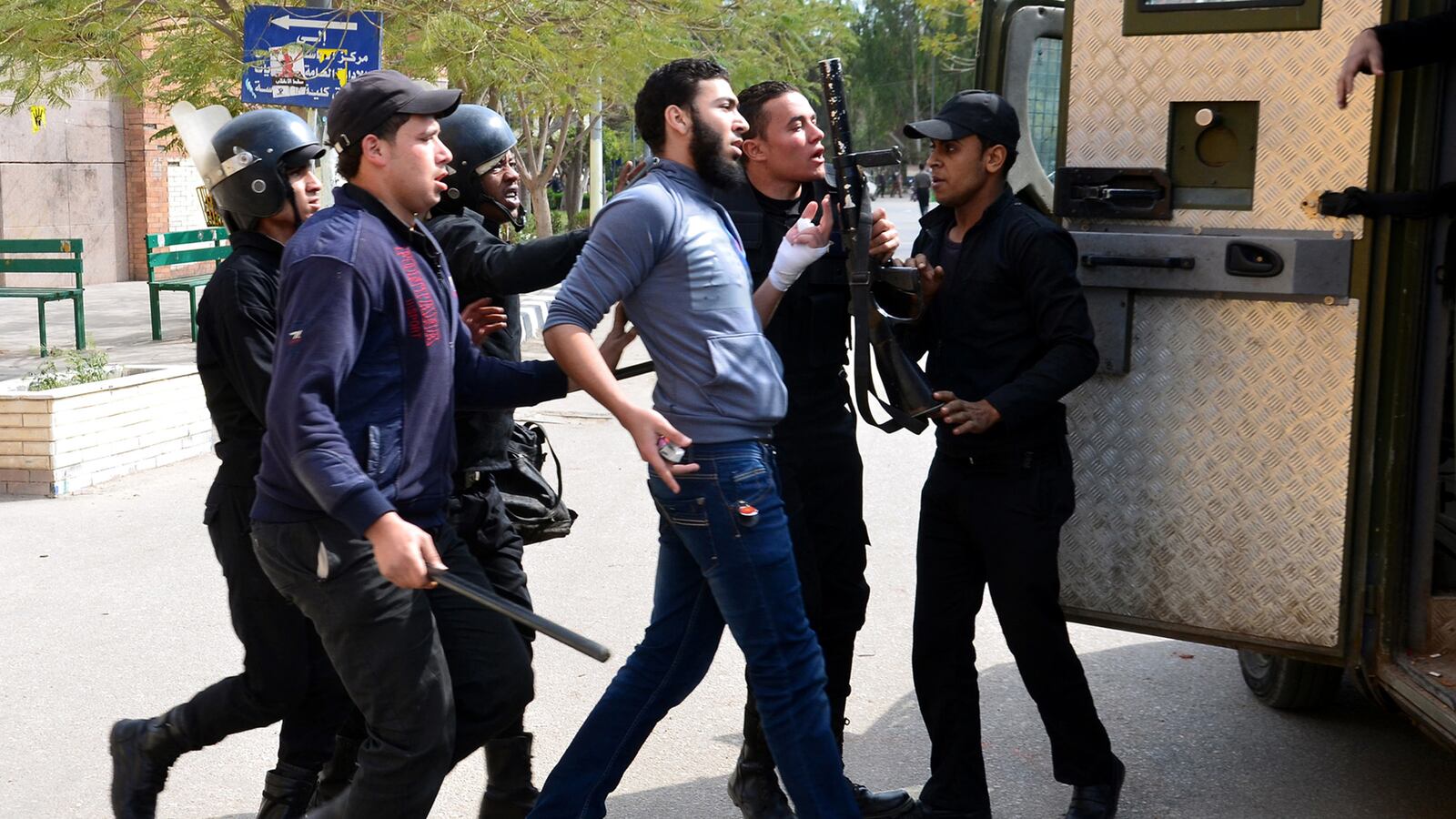CAIRO, Egypt—To the extent the Egyptian revolution that started in Tahrir Square more than three years ago still survives at all, it does so on university campuses. And all sides know that is where it will live—or where it will die.

Students began returning to classes after the long-delayed start of their second semester on March 12, and just as quickly demonstrations against Egypt’s military-installed government erupted at universities across the country. Since the overthrow of President Mohamed Morsi last July, the security forces have smashed and scattered most public demonstrations, killing 1,400 people and throwing more than 16,000 in prison. Yet students continue to turn out en masse.
Thousands of these young men and women held rallies across Egypt last week. They demanded the release of classmates jailed during the first semester. They called for an end to the torture of prisoners, and they demanded trials for members of the security forces who had slain students within the precincts of the country’s universities.
“Sixteen students have been killed on campus since September, five while being arrested—and another 1,347 have been arrested—since the coup,” says a young woman who goes by the nom de guerre Salma Saleh. She’s a campus leader at Cairo University for the anti-military group Students Against the Coup (SAC) and said she didn’t want her real name used because that would only increase the chance she’d be arrested.
While the students insist they will continue to expand their protests, they are facing government security forces and administrations in the state’s universities determined to put an end to the unrest. In February a judge rescinded a ban on police entering the campuses. Administrations have been dissolving elected student unions, suspending leading activists and firing professors who actively support them.
Last week at Mansoura University in Lower Egypt, a heavily armed Anti-Terrorism Unit from the Central Security Forces entered the campus in the midst of a student rally. On Wednesday, some of those same forces fired tear gas and live rounds into Cairo University as part of a clampdown across the country that saw one university student and a 13-year-old killed—the first deaths in the new semester. Also this week, 17 students were handed 14-year prison sentences for rioting.
As Salma and I walk through the campus, she’s nervous about being overheard. She says most members of her group support the deposed elected President Morsi, but she insists their demands differ from those of his organization, the Muslim Brotherhood, which has been banned as a terrorist organization.
“Now we want the basic demands of the revolution back,” she says, alluding to the demonstrations in Tahrir Square in January and February 2011 that ended the 30-year rule of President Hosni Mubarak.
We are constantly moving though the campus as she glances around, anxious about who might be listening and looking for undercover police. “We want our freedom back,” she says. “We want bread and social justice,” she contends, paraphrasing the slogan of the revolt that toppled Mubarak.
In universities, as in the rest of Egypt, the polarizing divisions in the country created under Morsi are driving a wedge between Islamists and liberals and leftwing opponents of the military’s power grab.
“I am against the Muslim Brotherhood and [also against] military rule,” says Sameh Ahmed, a Cairo university engineering student and spokesperson for the campus chapter of the social democratic Constitution Party once headed by erstwhile Vice President Mohammed El Baradei. Although Ahmed’s group shares many of the same demands as the Students Against the Coup, he doesn’t take part in the SAC protests. “I’m against the counter revolution, a coup against the revolution,” he says, alluding the ideals of the young people in Tahrir Square three years ago. But the SAC “oppose a coup against Morsi,” he says.
Instead, Ahmed’s coalition of leftists and liberals organize their own demonstrations condemning the killing of two students at Cairo University last semester and opposing the attacks on students on campus.
Such subtleties are lost, of course, on university administrations largely appointed by the government in the Mubarak era. According to Ahmed Hosni, deputy director of Al Azhar, Egypt’s famous ancient institute of religious learning, the protests are carried out by a small minority of students controlled by the leadership of the Muslim Brotherhood.
“Most students are welcoming the police and security [on campus],” he says, contending that state security forces will only enter if there’s violence and if requested to do so by the administration.
As students rallied outside Hosni’s office last Sunday, heavily armed police from Egypt’s Central Security Force under the command of the Ministry of Interior waited at the gates. Al Azhar has been the main flashpoint for campus protests. SAC contends that two students were killed in their dorms, which the administration admits, and seven were killed elsewhere on campus, which the university denies. Meanwhile, newly constructed concrete walls topped with cameras have gone up around the campus to contain protests.
Hosni maintains that students were only suspended for involvement in violence or graffiti on campus and that several professors were fired for inciting them. And then he adds a twist:
“We are always asking our students to keep the protests on campus, even if they go beyond the acceptable norms,” says Hosni. “Once they leave the gate, they are normal civilians without the protection of the university,” he says, and everyone understands the far greater violence that meets protesters in the streets.
For university administrators like those at Al Azhar, there’s a delicate balance between attempting to put an end to protests that they say are about national politics and so have no place on campus and preventing an unbridled wave of repression consuming Egypt’s universities.
Hosni says there is a committee of university administrators trying to support jailed students and he decries the killing of two students. He claims the committee has secured the release of 400 students in recent months. The SAC says that’s not so.
There is an explosive irony, in fact, at the center of this standoff. Despite the violence on campus, the restrictions that have restrained the security forces from passing through a university’s gates, along with the administrations’ grudging paternalism, have prevented the same kind of crackdowns that have been seen throughout the rest of the country. On campus, there is a space for students to organize and protest that might be attenuated, but it still exists.
“We used to have squares and the street, but now organizing on campus is a better option,” says Youssof Salhen, an Al Azhar SAC spokesperson and representative from the recently dissolved Student Union. As he speaks, hundreds of students are gathering next to the administration building, dropping banners from the roof calling for the release of prisoners and making speeches decrying the Central Security Force. Determined crowds of undergrads chant ecstatically as Salhen, a scraggily-bearded self-described independent Islamist wearing a t-shirt with “Muslim Power” written in English across the chest, declared that protests will continue because students across the country are determined to see an end to military rule.
The Ministry of Interior declined to comment.





